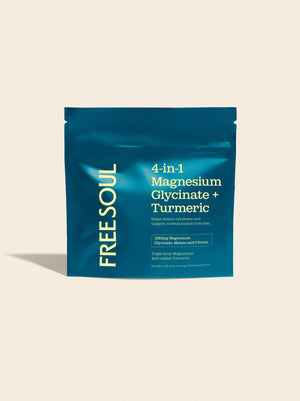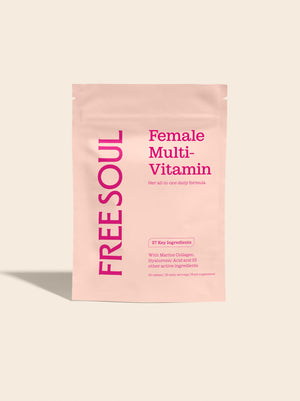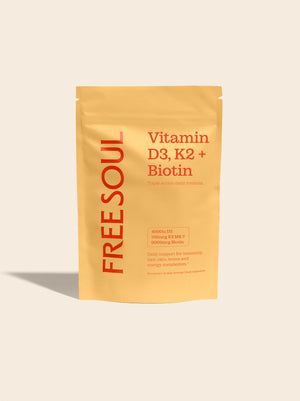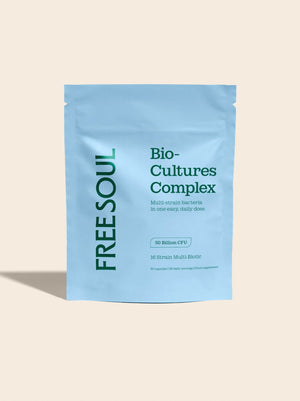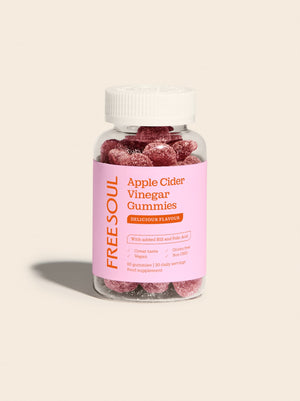“Protein Coffee is a smart choice for busy women,” explains Natalie Rouse, Registered Nutritionist and Head of Nutrition at Free Soul. “It’s an easy way to add more protein into your day, without overhauling your daily habits, helping you feel more energised and fuller for longer”.
Just as good whether you’re a regular gym-goer or just want some java that works harder, Protein Coffee is a simple way to top up your nutrition.
Ready to get on the proffee bandwagon? We’re breaking down the benefits of protein coffee, whether it's actually good for you, and how to fit it into your routine.
What are the benefits of Protein Coffee?
So, why combine protein and coffee? Here are some of the upsides of protein with your daily cup ‘o joe.
Hit your nutritional targets
One of the main protein powder in coffee benefits is that it helps you meet your daily protein needs with minimal effort. The recommended daily protein intake for a woman is around 45-55g per day, but hitting that number isn’t always easy. Many people squeeze most of their protein into a single evening meal, which isn’t ideal.
“Research shows it's better to spread protein intake out evenly throughout the day,” says Natalie. “Starting your day with protein coffee is a simple way to introduce more protein into your diet in the morning, for example, helping you stay on top of your nutritional goals from the get-go.”
Curb the cravings
Protein is the most filling macronutrient. It also stimulates the release of your satiety hormones, while reducing ghrelin, your hunger hormone. And here’s a bonus: up to 30% of the calories you get from protein are burned just through the digestion process (this is known as the thermic effect of food).
Coffee may also temporarily suppress appetite, making protein coffee a double‑whammy for keeping mid‑morning cravings at bay. So, it’s easier for you to power through to your next meal without reaching for the snacks.
Feel more switched on
Coffee brings the caffeine kick on its own, but pairing it with protein may slow its absorption, helping keep that boost steadier rather than a quick spike and crash. Protein also provides amino acids that support the production of neurotransmitters like dopamine and serotonin, which play a role in mood, focus, and alertness.
As Natalie explains, “Combining caffeine with protein may help you avoid the rollercoaster effect of coffee on an empty stomach, giving you a more balanced, longer-lasting sense of mental clarity”. That means you’re fuelling your brain for sustained clearer thinking, not just the short-lived high of a caffeine hit.
Make nutrition effortless
Another proffee benefit is its convenience for a busy routine. Life can get pretty hectic, and keeping up with your nutrition isn’t always easy. Protein Coffee makes it simple by “habit-stacking” – adding nutrition to something you’re already doing.
Instead of creating a whole new routine, or drastically revamping your eating habits, you’re turning your daily coffee into a protein-boosted drink. It’s an easy, low-effort way to stay on top of your goals.
Is Protein Coffee good for you?
Yes, when made with the right blends, protein coffee can absolutely be good for you. It can help you hit your nutritional goals, keep you feeling fuller for longer, and even double up as a pre‑ or post‑workout boost.
Here’s what to look for in a good Protein Coffee blend:
- A complete amino acid profile – Either a single protein source or a selective blend of sources that provide all nine essential amino acids
- Nutritionally balanced – Choose powders that are low in added sugars and unnecessary extras, ideally with added vitamins and minerals to support overall wellness
- Smooth mixability – Nobody wants lumpy protein coffee, so look for a fine-textured powder that blends easily for a café‑style drink
- Gentle on digestion – Look for blends that include digestive enzymes to make the protein easier on your stomach and improve nutrient absorption
As Natalie explains, “There are a lot of protein products out there, but many are packed with sugars and artificial additives. To make sure your Protein Coffee is good for you, always check the label and look for clean, high-quality ingredients that meet your needs”.
When’s the best time to drink Protein Coffee?
It depends on your preferences and schedule, but here are some popular options:
- Morning – Start the day with a Protein Coffee for a satisfying kick-start that keeps you satisfied till lunch
- Afternoon – if you struggle with the post-lunch slump, a Protein Coffee could help you stay sharp without reaching for sugary snacks
The best time is the one you can stick to consistently, whether that’s pre‑workout, with breakfast, or as a mid‑afternoon boost.
How to make Protein Coffee at home
You’ve got two options: DIY or ready‑to‑drink.
For the DIY route, simply mix your usual coffee with a scoop of protein powder. It works with both hot and iced coffee if you whisk or blend it well.
Or, keep it super simple with a ready‑to‑drink blend, like Free Soul’s Protein Iced Coffee – a creamy, café‑frappé style brew with less than 0.9g of sugar.
Need some inspiration? Check out our blog on 5 ways to enjoy your protein iced coffee.
Protein Coffee FAQs
Does protein coffee make you feel full?
Yes. Protein is the most satiating macronutrient, meaning it helps you feel fuller for longer. Adding protein to your morning (or afternoon) coffee can help you feel satisfied until your next meal.
Will protein coffee spike cortisol?
Caffeine does naturally increase cortisol levels for a brief time, especially on an empty stomach. Pairing coffee with protein may help buffer this effect slightly by slowing caffeine absorption and minimising the jitters.
Does protein coffee break a fast?
Yes. Protein triggers digestion and the release of insulin, so you’ll no longer be in a fasted state. But if your goal is simply to delay your first meal while managing hunger, it can be an excellent tool.
Does proffee taste different from regular coffee?
It can, but in a good way. Mixing protein powders with coffee gives it a creamy, shake‑like texture. Pre‑mixed options mean you get that café‑style taste with the added benefit of protein, without having to experiment in the kitchen.
Can I add other ingredients to protein coffee, like collagen or adaptogens?
Absolutely. Collagen, adaptogens, or even extra vitamins can easily be added to your Protein Coffee for extra functionality. Just keep in mind that too many add-ins might alter the texture and flavour, so a little trial and error might be needed.



